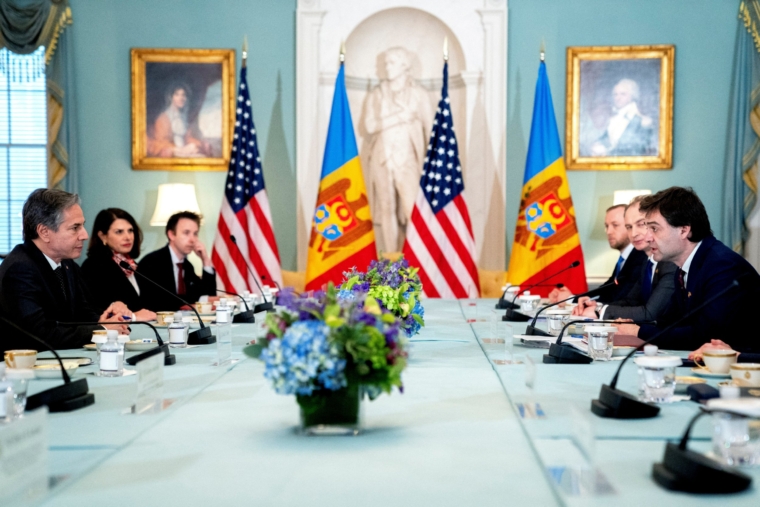Fears grow that two former Soviet republics, Moldova and Georgia, are next in the line of fire as Russia’s war in Ukraine continues, but experts say a hesitant West will not come to either’s rescue “any time soon”.
Moscow had used Ukraine’s bid to join the military alliance as a pretext to launch its invasion on 24 February. The ongoing conflict has now prompted Sweden and Finland, both traditionally neutral countries, to consider launching simultaneous bids to join Nato.
Neither Sweden nor Finland have been attacked by Russia, unlike Moldova and Georgia which have both seen Moscow’s aggression on their soil.
Could Moldova join Nato?
Moldova shares a roughly 750-mile border with Ukraine, including the breakaway region of Transnistria which has a heavily Russian-speaking population. The region is internationally recognised as part of Moldova, but has been under the control of Russian-backed separatists following a military conflict in 1992.
This week authorities in the region said shots were fired from Ukraine towards a village that houses an ammunition depot, following days of explosions that have hit radio masts and the state security service headquarters, raising concern that Transnistria could become a new flashpoint of the war.
Moldova has not made any attempt to join Nato as neutrality is enshrined in its constitution, something Nicholas Williams, a Nato expert from the European Leadership Network think tank, said he does not see changing any time soon.

One of Europe’s poorest nations, Moldova is among the most corrupt countries in the continent after Russia, Ukraine and Albania, according to Transparency International.
“To foreclose and foreshorten the procedures for joining Nato would be, in the case of Moldova and Georgia, a demonstrative enlargement without any substance, because they’re not in a condition to be a member, nor was Ukraine,” Mr Williams told i.
“They are countries which are corrupt, disorganised and disunited.”
He described Sweden and Finland as being “closely associated with Nato”, and that despite being neutral countries they have attended all “crisis management meetings in relation to Russia even before 24 February”.
He continued: “Nato considered that these countries had something to offer the alliance in terms of defence of its territory.”
Georgia’s bid for membership
Georgia has a 550 mile-long border with southern Russia, including the breakaway regions of Abkhazia and South Ossetia, whose independence Moscow had backed following the Russo-Georgian War in 2008.
During a Nato summit in Bucharest, Romania, in April 2008, the alliance decided not to offer Georgia and Ukraine a membership action plan (MAP) – a gateway to membership – largely due to opposition from Germany and France, amid concerns voiced by Russia over Nato’s eastward expansion.
The summit did, however, say Georgia could become a Nato member in the future provided it continued with reform efforts, much to the chagrin of Russia.
“Georgia’s and Ukraine’s membership in the alliance is a huge strategic mistake which would have most serious consequences for pan-European security,” Russia’s Deputy Foreign Minister Alexander Grushko said at the time.
Thornike Gordadze, former Georgian Europe minister and now a senior fellow at the International Institute for Strategic Studies think tank, told i that while Nato was congratulating itself for keeping the peace “by appeasing Russia”, the affect of its decision was to the contrary.
More on Russia-Ukraine war
In August that year, Russian forces began the invasion of Georgia which culminated in a five-day war, marking the first conflict in Europe in the 21st century.
The reaction from the West was “slow and weak”, said Mr Gordadze said, saying that this mistake led the Kremlin to launch its assault in Ukraine by annexing Crimea and supporting separatists in the eastern Donbas region.
The Obama administration in the US also offered Russia a “reset” policy to improve relations between Washington and Moscow “which was an even bigger mistake”, Mr Gordadze said, “because it gave Russia the impression that the West was weak, that it was giving carte blanche to attack Ukraine in 2014”.
He added: “After Georgia there were no sanctions at all, can you imagine?”
Mr Gordadze said he believes that had Ukraine and Georgia been offered MAP in 2008 then the subsequent Russian attacks may not have happened.
“My guess is that it would have raised the stakes so high that Russia would not have attacked Georgia and Ukraine later,” he argued.
“Why has Russia not attacked Baltic states (Latvia, Lithuania, Estonia)? Because they are in Nato. They’re even more vulnerable than Ukraine and Georgia because their armed forces are even weaker.”
As for Georgia’s ongoing bid to join the alliance, he said it will not happen “any time soon” as many Western nations are still afraid to get involved directly in the conflict with Russia.
But Mr Williams argued that Russia’s invasion of Ukraine has changed everything, adding that Nato is expected to debate in a summit this June on what help it can extend to Georgia.
“What I think Nato will do is associate the country closely with consultations, and individual allies will help – as they helped Ukraine – to train their forces and bolster their confidence to withstand a Russian assault,” he said.

